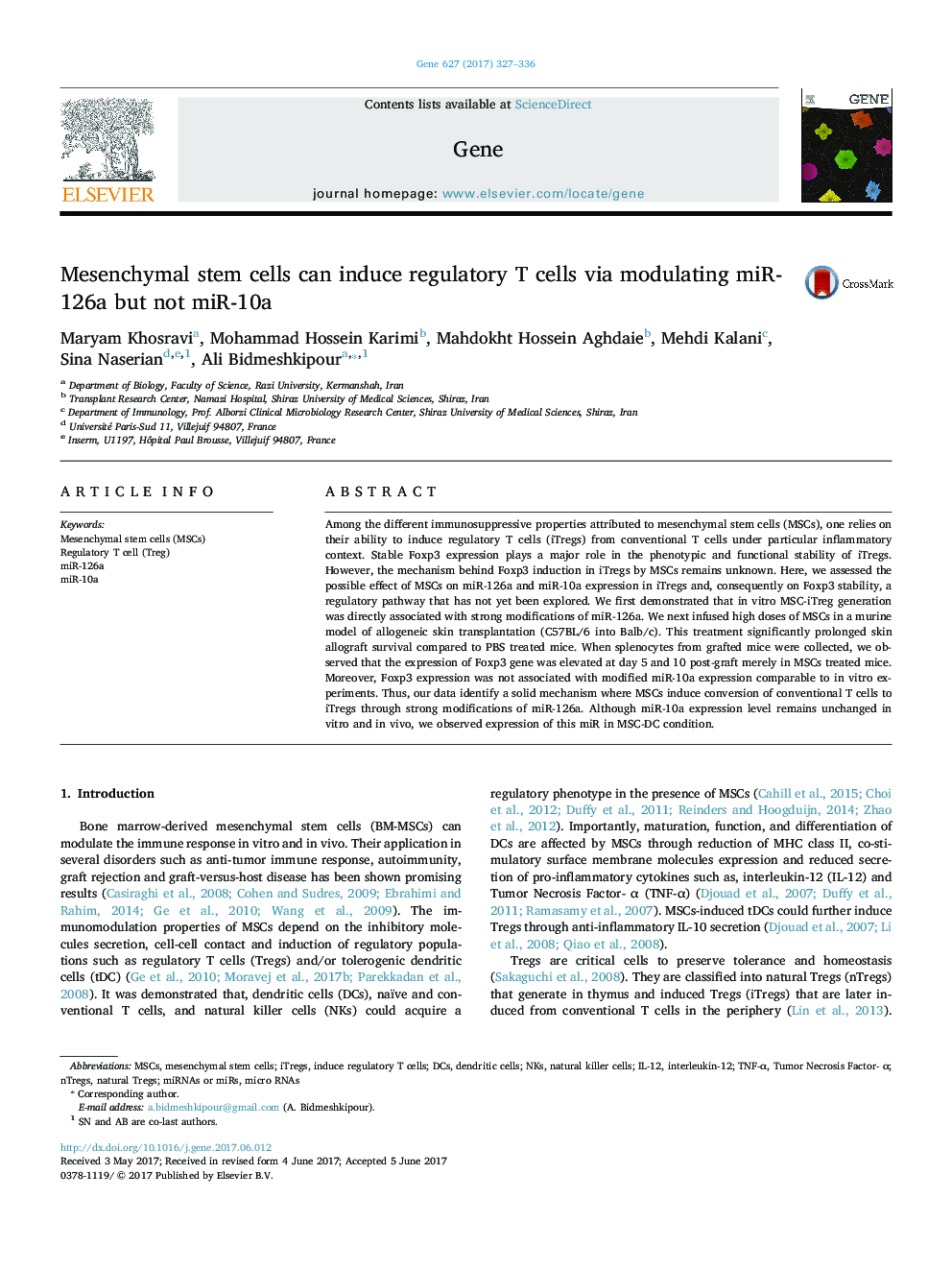| کد مقاله | کد نشریه | سال انتشار | مقاله انگلیسی | نسخه تمام متن |
|---|---|---|---|---|
| 5589644 | 1569809 | 2017 | 10 صفحه PDF | دانلود رایگان |
عنوان انگلیسی مقاله ISI
Mesenchymal stem cells can induce regulatory T cells via modulating miR-126a but not miR-10a
دانلود مقاله + سفارش ترجمه
دانلود مقاله ISI انگلیسی
رایگان برای ایرانیان
کلمات کلیدی
MSCsDCsRegulatory T cell (Treg)IL-12NKSiTregsnTregsNatural TregsmiR-10aMicro RNAs - RNA های میکروinterleukin-12 - اینترلوکین -12Mesenchymal stem cells - سلول های بنیادی مزانشیمیMesenchymal stem cells (MSCs) - سلول های بنیادی مزانشیمی (MSCs)Dendritic cells - سلول های دندریتیکNatural killer cells - سلولهای کشنده طبیعیTumor Necrosis Factor- α - عامل ناکروز تومور- αTNF-α - فاکتور نکروز توموری آلفا
موضوعات مرتبط
علوم زیستی و بیوفناوری
بیوشیمی، ژنتیک و زیست شناسی مولکولی
ژنتیک
پیش نمایش صفحه اول مقاله

چکیده انگلیسی
Among the different immunosuppressive properties attributed to mesenchymal stem cells (MSCs), one relies on their ability to induce regulatory T cells (iTregs) from conventional T cells under particular inflammatory context. Stable Foxp3 expression plays a major role in the phenotypic and functional stability of iTregs. However, the mechanism behind Foxp3 induction in iTregs by MSCs remains unknown. Here, we assessed the possible effect of MSCs on miR-126a and miR-10a expression in iTregs and, consequently on Foxp3 stability, a regulatory pathway that has not yet been explored. We first demonstrated that in vitro MSC-iTreg generation was directly associated with strong modifications of miR-126a. We next infused high doses of MSCs in a murine model of allogeneic skin transplantation (C57BL/6 into Balb/c). This treatment significantly prolonged skin allograft survival compared to PBS treated mice. When splenocytes from grafted mice were collected, we observed that the expression of Foxp3 gene was elevated at day 5 and 10 post-graft merely in MSCs treated mice. Moreover, Foxp3 expression was not associated with modified miR-10a expression comparable to in vitro experiments. Thus, our data identify a solid mechanism where MSCs induce conversion of conventional T cells to iTregs through strong modifications of miR-126a. Although miR-10a expression level remains unchanged in vitro and in vivo, we observed expression of this miR in MSC-DC condition.
ناشر
Database: Elsevier - ScienceDirect (ساینس دایرکت)
Journal: Gene - Volume 627, 5 September 2017, Pages 327-336
Journal: Gene - Volume 627, 5 September 2017, Pages 327-336
نویسندگان
Maryam Khosravi, Mohammad Hossein Karimi, Mahdokht Hossein Aghdaie, Mehdi Kalani, Sina Naserian, Ali Bidmeshkipour,